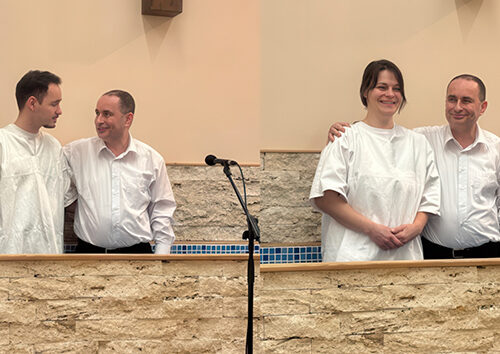13 July 2023 | Friedensau Adventist University, Germany [tedNEWS]
In April, sixty leaders of Family Ministries from the Trans-European (TED) and Inter-European (EUD) Divisions gathered at Friedensau Adventist University in Germany to explore a biblical view of sexuality. Numerous readers of tedNEWS expressed their desire for further details on the workshops conducted during the event, as well as the resources that were made accessible. Below is an overview of one of the workshops presented.
In her workshop, Vanesa Pizzuto explored the repercussions of growing up in the Purity Culture movement.¹ She focused on three primary fear-based teachings within the movement: the belief that one’s body is intrinsically sinful, the belief that one’s value depends on good behaviour (e.g. virginity), and the notion that others should dictate how one’s body looks. Drawing on biblical perspectives and recent research studies, Pizzuto shed light on the profoundly negative consequences of these approaches. “Our worth is intrinsic, is God-given,” she emphasised. “Empowering teens to make wise decisions must always acknowledge this truth, or we’ll cause much harm.”
One such negative consequence is the impact of Purity Culture on sexual satisfaction. Studies indicate, for instance, that 37% of women who were raised with the belief that wives are obligated to provide sex to their husbands (a Purity Culture teaching) experience painful intercourse, or the inability to have sex due to muscle spasms. Tragically, this percentage is statistically similar to that found in cases of abuse. “When we shame people into submission, we use the weapons of the enemy. Expecting healthy and thriving relationships to be the outcome of such emotional manipulation is simply irrational,” Pizzuto commented
Implying that if teenagers remain virgins, God will reward them with spouses and incredible sex, is emotional prosperity Gospel.
According to Pizzuto, the solution does not lie in abandoning all values, but rather in teaching the truth without shame or exaggerated promises. “Implying that if teenagers remain virgins, God will reward them with an amazing spouse for incredible sexual experiences is akin to promoting emotional prosperity Gospel. It’s important to recognise that, in a free universe, there are no guarantees,” she emphasised. Instead, Church leaders should equip teens to recognise legalistic and transactional interpretations of the Gospel, even if repackaged as “guaranteed marital bliss.” Doing so involves being truthful, providing relevant scientific data, and respecting their autonomy. “The people in our lives should know that even if they choose something we may not agree with, we won’t shame or manipulate them,” she stated.

Pizzuto highlighted the importance of providing shame-free sex education, which she built upon three fundamental pillars: 1) Biblical values, 2) Respect for free will and dignity, and 3) Sharing scientific and trauma-informed data. She firmly advocated against the use of shame as an educational tool, as she explained, “What our nervous system has learned to consider as shameful will not instantly become pleasurable the moment we say ‘I do’.” Pizzuto explored the lasting impact that toxic messages can have on our bodies, underscoring the need for an educational approach that prioritises respect, understanding, and accurate information.
She concluded her presentation by offering valuable tips on cultivating a positive relationship with one’s body. Pizzuto recommended engaging in grounding exercises and exploring whole-bodied decision making. Additionally, she shared a list of recommended books and resources for further exploration, including:
The Great Sex Rescue, by Sheila Wray Gregoire.
The Wisdom of Your Body, by Hillary L. McBride.
The Body Keeps the Score, by Bessel van der Kolk.
Vanesa Pizzuto is a journalist and educator serving as Communication and Media associate director for the TED. Her book No Fears No Chains, invites women to reclaim the terrain conquered by fear and live from a place of emotional abundance.
¹In the 1990s and 2000s, a Christian movement now known as “Purity Culture” reached its peak. Although the movement was most significant in the USA, its impact is global and ongoing. The Purity Culture movement was founded on the concept of sexual abstinence until marriage. However, it evolved into a subculture within evangelical Christianity in the USA. The movement sparked a thriving industry of purity-themed Bibles, rallies, purity rings, and books (such as Joshua Harris’ “I Kissed Dating Goodbye”). In addition to other problematic teachings, the movement promoted gender double standards and employed shame as a pedagogical tool (with girls being compared to a piece of chewed-up gum if they had sex before marriage). To read more about the distinction between Purity Culture and the Christian sex ethics, read Tim Keller’s No, Sexual Abstinence is Not Same As Purity Culture.
[Photos: featured image by Tor Tjeransen, AME CC BY 4.0 /Adobe Stock]



